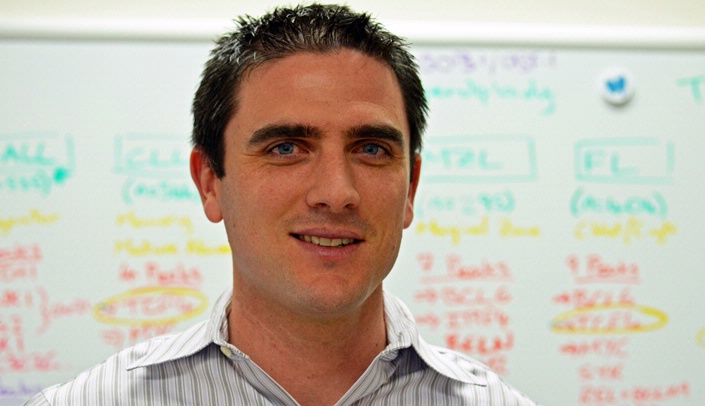A new recruit to the Fred & Pamela Buffett Cancer Center begins his UNMC career on the heels of a major contribution to a breakthrough in Hodgkin’s lymphoma treatment.
Clinical trial results for the new therapy inspired by his research were detailed in a December 2014 edition of The New England Journal of Medicine.
Michael Green, Ph.D., assistant professor in the Eppley Institute, while a postdoc at Dana-Farber Cancer Institute in Boston in 2010, was first author on the discovery of a therapy target — a gene whose increased expression allowed cancer cells to evade being seen and eradicated by the immune system.
Expression of this gene may be why Hodgkin’s relapse rates can be as high as 25 percent.
“It’s a ligand on the tumor cell surface that binds to a receptor on the T-cell and tells them not to perform their normal function,” Dr. Green said. “Its natural role in biology is after an infection to try and bring down the immune response after the infection has been cleared. But it has been hijacked by these cancer cells so they can shut down an anti-tumor immune response.”
Thankfully, there was a potential neutralizing antibody already in clinical trials. So a study involving patients with relapsed or refractory lymphoma got to skip straight to Phase II, to “a pretty remarkable result,” Dr. Green said.
The treatment was awarded breakthrough therapy (BT) designation by the FDA.
Dr. Green had already left for Stanford University by the time the clinical trial started, but feels very satisfied with the end result.
“That’s why we do what we do,” he said. “Publications and grants are nice but this is the real reason behind our research.”
At Stanford, Dr. Green turned his attention to the as-yet incurable follicular lymphoma. And there is no better place to continue this research, he decided, than at UNMC, where Jim Armitage, M.D., and Julie Vose, M.D., head up a world-renowned lymphoma study group.
“That was imperative in coming here,” he said. “I’m doing a lot of next-generation sequencing and there’s a genomics core here. I do a lot of immunology and there’s a very good flow cytometry core here. And the biggest thing really is a massive bank of tumors here.”
And the relationship history with the patients who gave them.
Now, Dr. Green is studying a novel gene mutation which helps follicular lymphoma cells evade the immune system. “We have defined the mutation we want to target, so now we are trying to identify a specific therapy — it is a great example of ‘precision medicine.'”
It happened once. It can happen again.

This is incredible………… bravo to these passionate, hard working, brilliant souls.
working everyday to bring light to that terrible pace.
may the road rise up to meet you